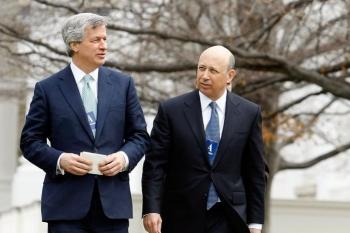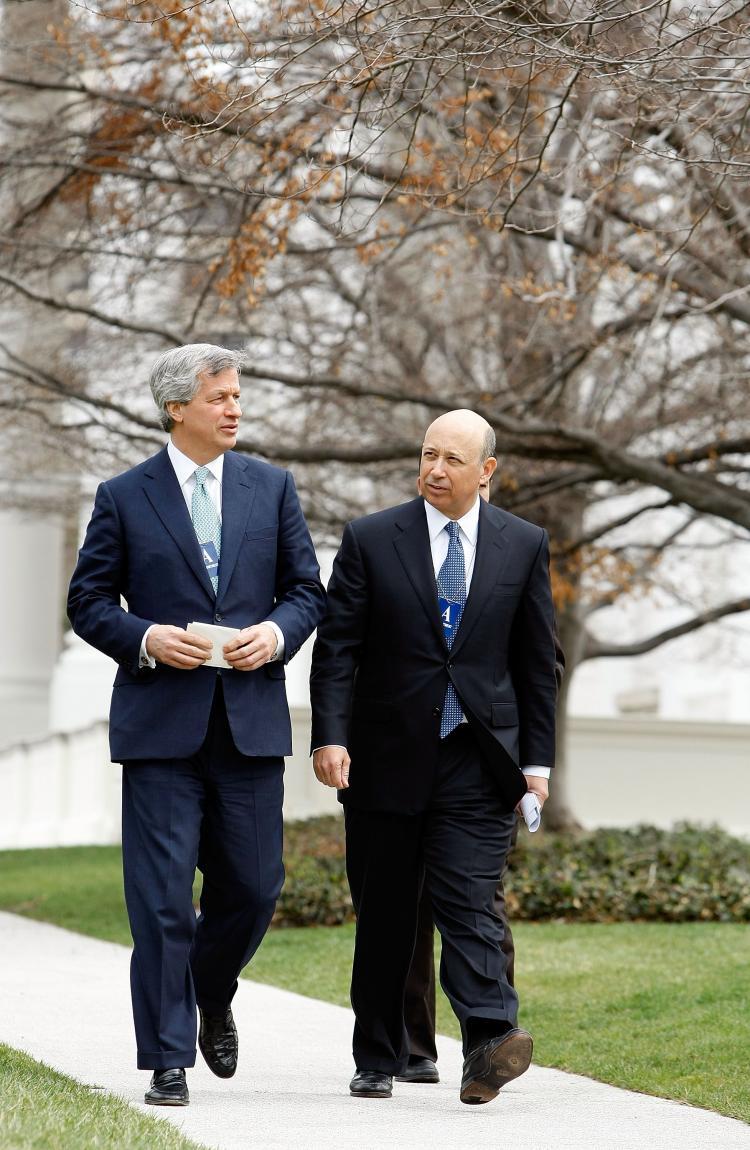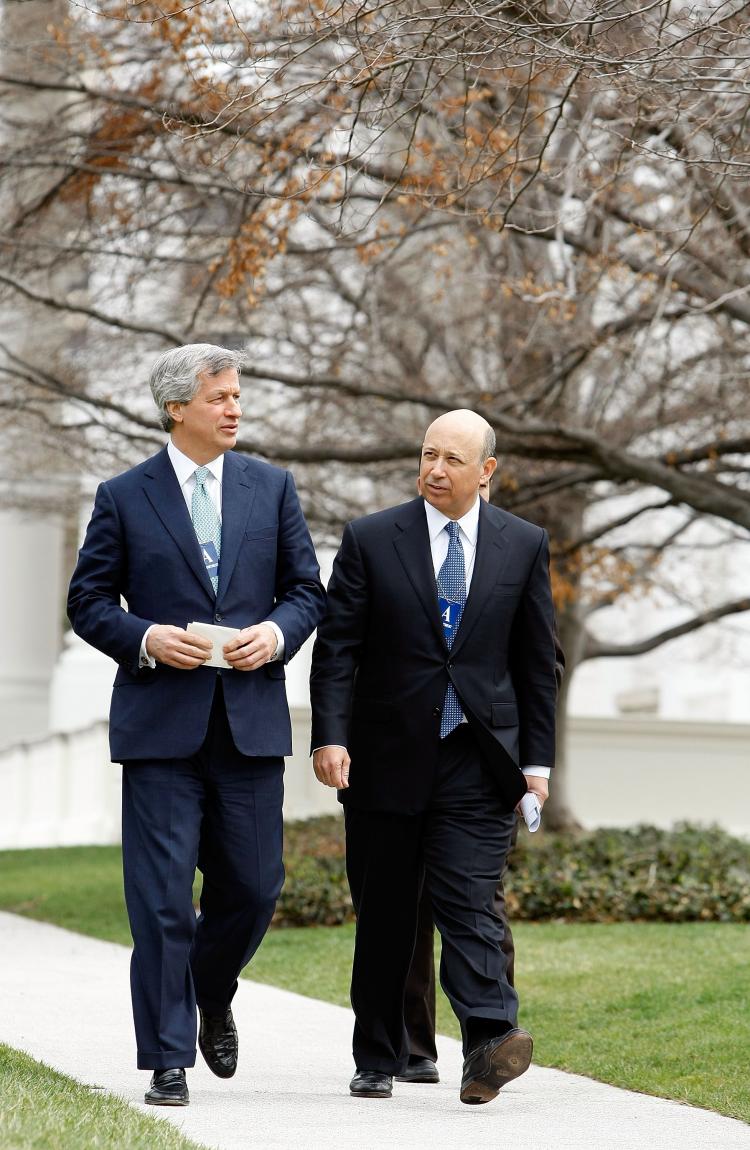NEW YORK—Goldman Sachs Group Inc.’s reputation took a hit last Friday as the U.S. Securities and Exchange Commission (SEC) slapped Wall Street’s most profitable firm with securities fraud charges.
The SEC charged that Goldman engaged in fraud while underwriting $1 billion of synthetic collateralized-debt obligations (CDO) backed by subprime residential mortgage-backed securities in 2007.
The securities in question are called ABACUS 2007-AC1, and Goldman structured and marketed the securities while failing to disclose that it also advised a hedge fund client—Paulson & Co.—that has taken a short position against the security.
“The product was new and complex but the deception and conflicts are old and simple,” said Robert Khuzami, Director of the Division of Enforcement at the SEC, in a statement.
“Goldman wrongly permitted a client that was betting against the mortgage market to heavily influence which mortgage securities to include in an investment portfolio, while telling other investors that the securities were selected by an independent, objective third party.”
In layman’s terms, Goldman told a group of investors that the security would rise while knowing—and advising another group of investors—that it would probably decline in value.
Paulson, which was poised to reap huge gains should the mortgage-backed securities default, had an economic incentive to select the securities that had a higher chance of defaulting. Paulson is not charged with wrongdoing in the case.
In a response, the investment bank called the lawsuit “unfounded,” and said that Goldman itself was an investor in the CDO, and lost more than $90 million on the transaction. It would not purposefully structure a portfolio designed to lose money. Goldman also argued that ACA Capital Management and a large German bank IKE, both of which took a long position on the security, had input in the selection and ACA had the ultimate approval power.
Goldman has been carefully crafting its image to the public in recent months, including touting how the bank helps small businesses and emerging markets. But the SEC charges should be a regulatory and public relations nightmare for Goldman and its CEO, Lloyd Blankfein, who earlier told U.K. media that his bank was “doing God’s work.”
But the charges may yet broaden, the SEC suggests. Last Friday, the SEC said that investigators were scrutinizing other products and practices at Wall Street investment banks, which may lead to more charges against Goldman Sachs and other banks. According to one industry insider who wished to remain anonymous, Goldman’s actions are a “dime in a dozen” at investment banks.
The news hit the broader stock market, as the Dow Jones Industrial Average shed 125.9 points, or 1.13 percent. Friday’s stock market drop disrupted an otherwise positive first-quarter earnings season on Wall Street, and renewed investor skepticism over the financial markets.
Goldman’s shares dropped nearly 13 percent on the New York Stock Exchange last Friday, declining $23.57 to settle at $160.70. The drop was the biggest one-day decline in the company’s history.
The news also sent shares of other financial firms down on Friday—JPMorgan Chase & Co. was down 4.6 percent, Citigroup saw its shares drop 5.2 percent, and Morgan Stanley’s stock decreased by 5.6 percent.
Separately, President Barack Obama said that he would veto any reform bill that does not offer tough regulation on the $450 trillion over-the-counter financial derivatives market.
One version of derivatives legislation introduced would require a large segment of the derivatives market to trade through clearinghouses, or intermediaries between buyers and sellers. “End-users” of the derivatives, or manufacturing firms and other companies that use the derivatives to hedge against commodity volatility, would be exempt from the regulations.
But late last week, all 41 Republican U.S. Senators wrote in a letter to Majority Leader Sen. Harry Reid (D-N.V.) in opposition to the financial reform bill currently under negotiations.
Both sides of the aisle agreed that action is needed to curtail excess risk-taking on Wall Street, but “as currently constructed, this bill allows for endless taxpayer bailouts of Wall Street and establishes new and unlimited regulatory powers that will stifle small businesses and community banks,” the Republican senators argued.
But one thing might be certain on the heels of the Goldman news—Washington has put Wall Street on notice.
“The days of backroom Wall Street deals are over,” Sen. Blanche Lincoln (D-Ark.) said in a statement. And he may well be right.
The SEC charged that Goldman engaged in fraud while underwriting $1 billion of synthetic collateralized-debt obligations (CDO) backed by subprime residential mortgage-backed securities in 2007.
The securities in question are called ABACUS 2007-AC1, and Goldman structured and marketed the securities while failing to disclose that it also advised a hedge fund client—Paulson & Co.—that has taken a short position against the security.
“The product was new and complex but the deception and conflicts are old and simple,” said Robert Khuzami, Director of the Division of Enforcement at the SEC, in a statement.
“Goldman wrongly permitted a client that was betting against the mortgage market to heavily influence which mortgage securities to include in an investment portfolio, while telling other investors that the securities were selected by an independent, objective third party.”
In layman’s terms, Goldman told a group of investors that the security would rise while knowing—and advising another group of investors—that it would probably decline in value.
Paulson, which was poised to reap huge gains should the mortgage-backed securities default, had an economic incentive to select the securities that had a higher chance of defaulting. Paulson is not charged with wrongdoing in the case.
In a response, the investment bank called the lawsuit “unfounded,” and said that Goldman itself was an investor in the CDO, and lost more than $90 million on the transaction. It would not purposefully structure a portfolio designed to lose money. Goldman also argued that ACA Capital Management and a large German bank IKE, both of which took a long position on the security, had input in the selection and ACA had the ultimate approval power.
Industry Repercussions
To many commentators, SEC appears to have finally showed some teeth by going after Wall Street’s biggest and most influential bank. Goldman Sach’s Washington connections are strong, as both former Treasury Secretary Henry Paulson—no relation to Paulson & Co.—and former TARP program manager Neel Kashkari were Goldman alumni.Goldman has been carefully crafting its image to the public in recent months, including touting how the bank helps small businesses and emerging markets. But the SEC charges should be a regulatory and public relations nightmare for Goldman and its CEO, Lloyd Blankfein, who earlier told U.K. media that his bank was “doing God’s work.”
But the charges may yet broaden, the SEC suggests. Last Friday, the SEC said that investigators were scrutinizing other products and practices at Wall Street investment banks, which may lead to more charges against Goldman Sachs and other banks. According to one industry insider who wished to remain anonymous, Goldman’s actions are a “dime in a dozen” at investment banks.
The news hit the broader stock market, as the Dow Jones Industrial Average shed 125.9 points, or 1.13 percent. Friday’s stock market drop disrupted an otherwise positive first-quarter earnings season on Wall Street, and renewed investor skepticism over the financial markets.
Goldman’s shares dropped nearly 13 percent on the New York Stock Exchange last Friday, declining $23.57 to settle at $160.70. The drop was the biggest one-day decline in the company’s history.
The news also sent shares of other financial firms down on Friday—JPMorgan Chase & Co. was down 4.6 percent, Citigroup saw its shares drop 5.2 percent, and Morgan Stanley’s stock decreased by 5.6 percent.
Pushing for Financial Reform
The Goldman Sachs news likely will expedite the push for Wall Street financial reforms championed by the Obama Administration.Separately, President Barack Obama said that he would veto any reform bill that does not offer tough regulation on the $450 trillion over-the-counter financial derivatives market.
One version of derivatives legislation introduced would require a large segment of the derivatives market to trade through clearinghouses, or intermediaries between buyers and sellers. “End-users” of the derivatives, or manufacturing firms and other companies that use the derivatives to hedge against commodity volatility, would be exempt from the regulations.
But late last week, all 41 Republican U.S. Senators wrote in a letter to Majority Leader Sen. Harry Reid (D-N.V.) in opposition to the financial reform bill currently under negotiations.
Both sides of the aisle agreed that action is needed to curtail excess risk-taking on Wall Street, but “as currently constructed, this bill allows for endless taxpayer bailouts of Wall Street and establishes new and unlimited regulatory powers that will stifle small businesses and community banks,” the Republican senators argued.
But one thing might be certain on the heels of the Goldman news—Washington has put Wall Street on notice.
“The days of backroom Wall Street deals are over,” Sen. Blanche Lincoln (D-Ark.) said in a statement. And he may well be right.






